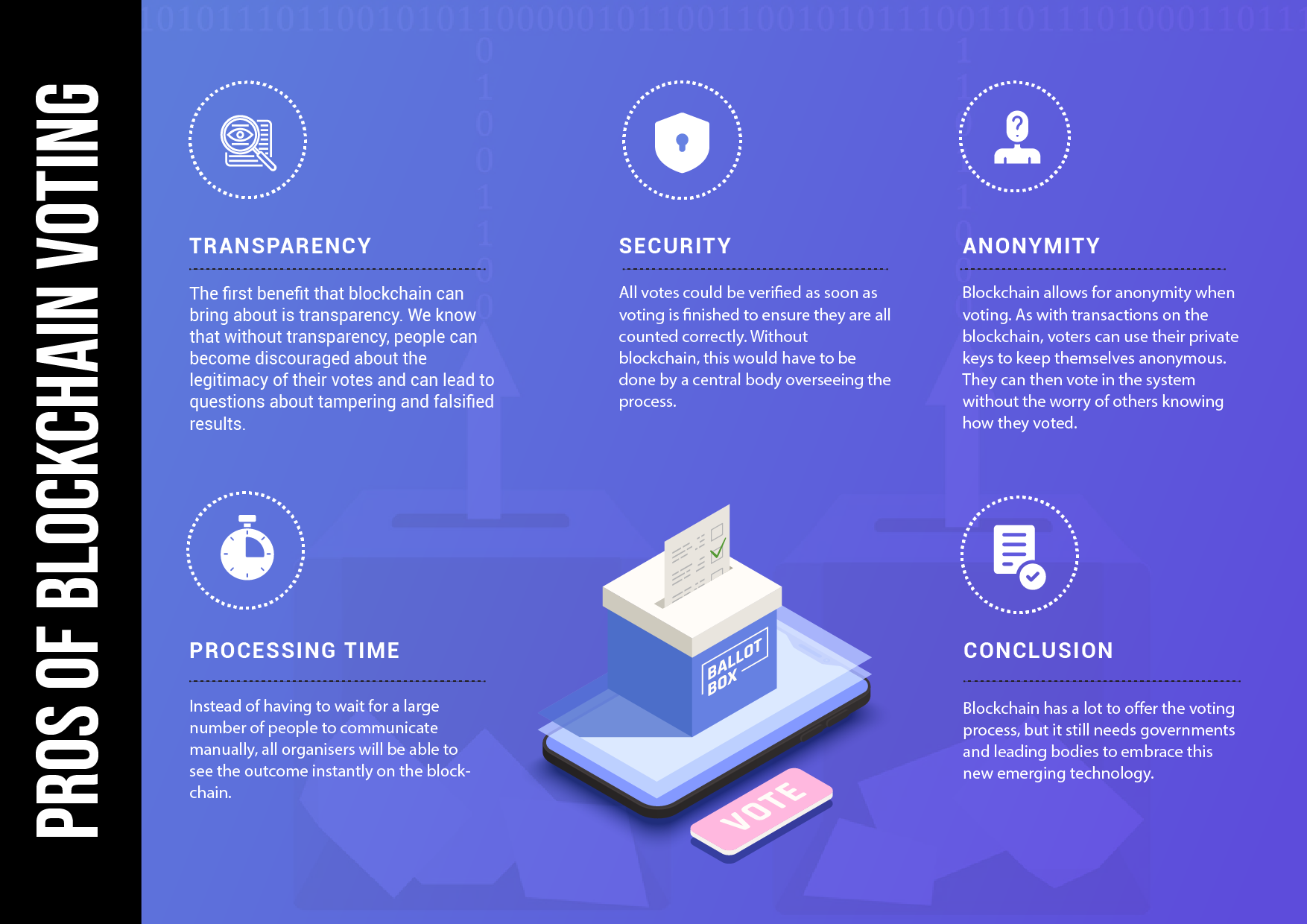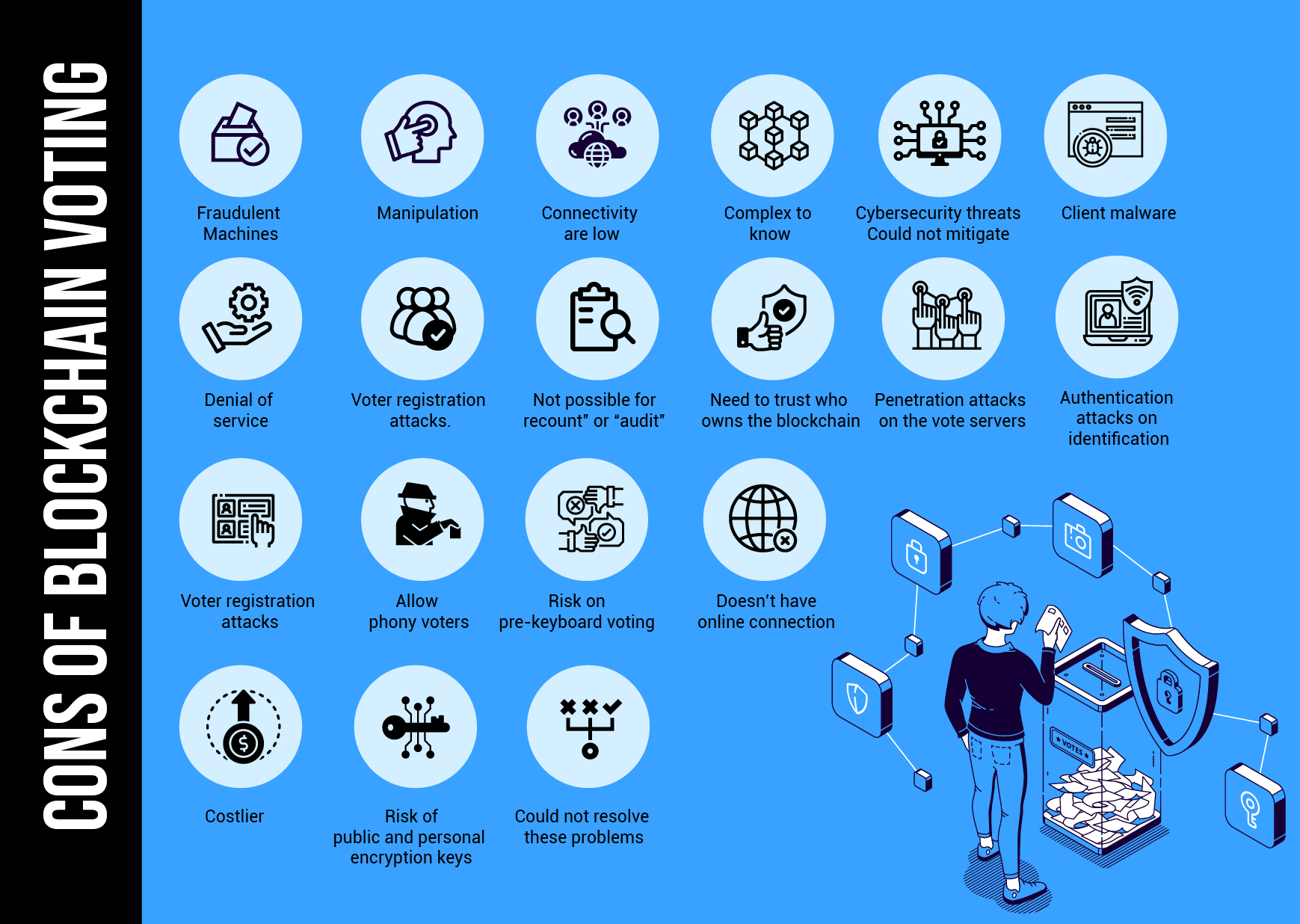
Modern life is increasingly digital. Today we follow courses, do shopping, banking, and lots of tasks online. Despite this digitalization, we still stick with paper and ballet when voting.
Voting rights are a crucial part of Democracy. But elections today face violence, corruption, long waiting time, accessibility, affordability, and privacy. General elections still use a centralized system; there’s one organization that manages it. A variety of the problems that can occur in traditional electoral systems is with an organization with full control over the database and system; it’s possible to tamper with it.
Replacement of the normal electoral system is essential to limit fraud and form voting because the counting process is more transparent.
A system is required that makes voting convenient for the voters besides reducing the value of conducting elections.
This system should also allow the voters to vote, albeit they’re not in their Home State/country.
So researchers have found an answer to the problems mentioned above within the blockchain platform.
PROS Of Blockchain Voting

Blockchain can assist in implementing an immutable, transparent electronic electoral system that can’t be hacked into, to vary the results.
A Blockchain is a reasonable and effective means to conduct fair elections. The blockchain technology decentralizes the voting process so everyone can have a replica of the complete voting record. So it’ll prevent illegal and faux votes.
The data of the voters are encrypted to guard the identity of voters.
Blockchain voting has already been utilized in smaller organizations for deciding.
Some say that Blockchain voting could allow people to interact more deeply and make deciding more fluid. People could regularly vote on all types of issues, and they might update their votes if they modify their minds. They might also follow the votes of other individuals they trust.
Blockchain technology allows us to encode elections into smart contracts so that once the votes are counted, the results automatically become a self-implementing manifesto.
It might be the breakthrough insecurity that’s needed to enable e-voting. Cryptographic techniques are employed to ensure the general safety of the voting systems to extend its wide adoption. However, in such electronic voting systems, the overall public bulletin board that’s hosted by the third party for publishing and auditing the voting results should be trusted by all participants.
Recently a spread of blockchain-based solutions is proposed to affect this issue. However, these systems are impractical because of the restrictions on the voters’ and candidates’ support.
However, e-voting is additionally susceptible to both technical issues and frauds. But Blockchain may convince be the fix that governments and their citizenry are trying to find to reinforce the voting. Many experts think that DLT offers the four most prominent features every electoral system requires: Security, Transparency, Accessibility, and Auditability.
Since more and more people own computers or cellphones, a blockchain-based online electoral system can make it easier for the bulk of eligible voters to cast their votes. Indeed, every “record” entered into a blockchain network gets a date and time stamp and a cryptographic hash of the previous block, making auditing quick and automatic.
An open-source blockchain electoral system’s advantages are that it’s open and doesn’t have restrictive calculations, enabling residents and offices to review usefulness and enhance security.
In blockchain platforms for voting, voters utilize webcam and government-provided ID remotely and safely check in to cast a vote. After they’ve chosen their applicants, they will utilize their novel voter ID to open the virtual voting station and ensure their vote is out there and goes right.
In short, Blockchain for voting and election may be a case study of digitizing the electoral system. It’s entirely different that there is no central authority who can tamper or manipulate the system. The central authority within the blockchain electoral system is that the smart contract maybe a piece of code that can’t be altered at any cost after their deployment.
Results entered and stored on the Blockchain aren’t just immutable and transparent; however––they’re also immediately available. Meaning conducting our elections on the Blockchain isn’t only safer but also more efficient.
The Blockchain, offers a reality during which that human error is taken out of the equation and results are counted immediately
It ensures anonymity while remaining available for public inspection, which makes it perfect for voting.
CONS Of Blockchain Voting

By voting on a blockchain, you’re eliminating one among the voter fraud sources: database manipulation. However, this still leaves tons of potential areas of abuse open, including:
- Fraudulent Machines
Votes on a blockchain are hard to control, but the hardware connecting to the chain are often abused.
- Manipulation
Blockchain can prevent manipulation of knowledge, but can’t prevent the manipulation of individuals and their rights.
- In addition, thereto being bad for the political parties and politicians, the most important challenge would be to urge the answer to every single citizen, eligible to vote, especially in countries where internet connectivity, mobile penetration, and awareness, generally, are low.
- Blockchain is complex to know.
- The problem is that online voting, no matter how it’s implemented, is subject to a variety of fundamental cybersecurity threats that blockchains do nothing to mitigate.
- Client malware — The computers and devices people might vote from are often infected with malware, and therefore the result’s that their ballots could also be modified undetectably before they even leave the voter’s device. Malware also can simply prevent you from voting or could leak your vote to 3rd parties, thereby exposing you to retaliation or allow you to participate during a vote-selling scheme.
- Denial of Service — Any or all of the network nodes or servers involved, or the infrastructure around them, (firewalls, routers, etc.) are often subject to DoS attacks from anywhere within the world, and therefore the election brought down that way.
- Like all Internet voting systems, blockchain voting systems are subject to voter registration attacks.
- It isn’t possible for officials to try to to a meaningful “recount” or “audit” of the ballots, because there’s no original paper ballot to audit within the first place.
- Voters simply need to trust election officials and, worse, the election officials themselves need to trust the seller who owns and hosts the Blockchain.
- Penetration attacks on the vote servers, allow the attackers to selectively prevent votes from being stored within the Blockchain.
- Authentication attacks that prevent voters from successfully identifying themselves over the web and being allowed to vote thanks to identity protection.
- Voter registration attacks that prevent votes from being recognized as a registered voter within the jurisdiction they reside in or that incorrectly show them as having already voted.
- Authentication attacks which may allow phony voters to impersonate real voters online
- Blockchain voting is secure from the keyboard to the ledger; however, there are risks related to fraud, extortion and etc. on the pre-keyboard a part of voting.
- One of the main security risks of Blockchain is Public and personal Encryption Keys. This is often because there’s a high possibility that the users either save security keys carelessly or share them with the person.
- Every individual doesn’t have an online connection.
- If a private doesn’t have internet access, the State or the country should make it available to him.
- This method is costlier than the normal method.
- Blockchain does nothing to eliminate the above-mentioned problems.
Blockchain may be a good idea, but it’s still subjugated to equivalent security risks as the other system.
Like many technological solutions to complex problems, it fetishizes sophistication and efficiency and completely ignores the human element. The foremost important criteria for any electoral system isn’t efficiency or maybe security, but public confidence. Electoral systems not only need to be fair, but the overall public has got to believe that they’re fair; the defeated candidate has got to believe that they were defeated fairly.
The overwhelming majority of the population haven’t the slightest idea what a blockchain is, or how it works, and thus will haven’t any confidence within the concept it can guarantee both security and anonymity. They are, on the opposite hand, because of the show business, under the somewhat inaccurate but not entirely untrue impression that “anything is often hacked.” Allowing people to vote unsupervised is fraught with danger.
On top of all of that, it might do nothing to stop in-person voter fraud and will massively increase absentee voter fraud, because there’s no supervision to the present in the least. There are no possible thanks to knowing if the person on the opposite end of that smartphone or computer terminal actually is who they assert they’re just by using Blockchain.
Despite these pros and cons, With countries and native governments having an extended and hard check out distributed ledger technology, we will presume that limited-scale implementation of blockchain voting systems will prevail within the year ahead. And that we may even see the implications gone with the utilization of Blockchain technology for voting.




